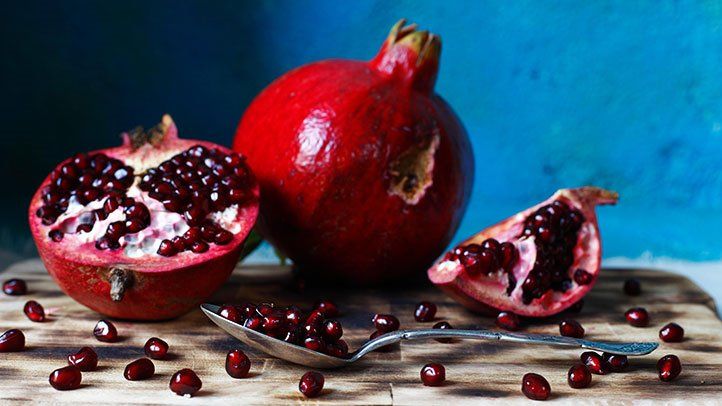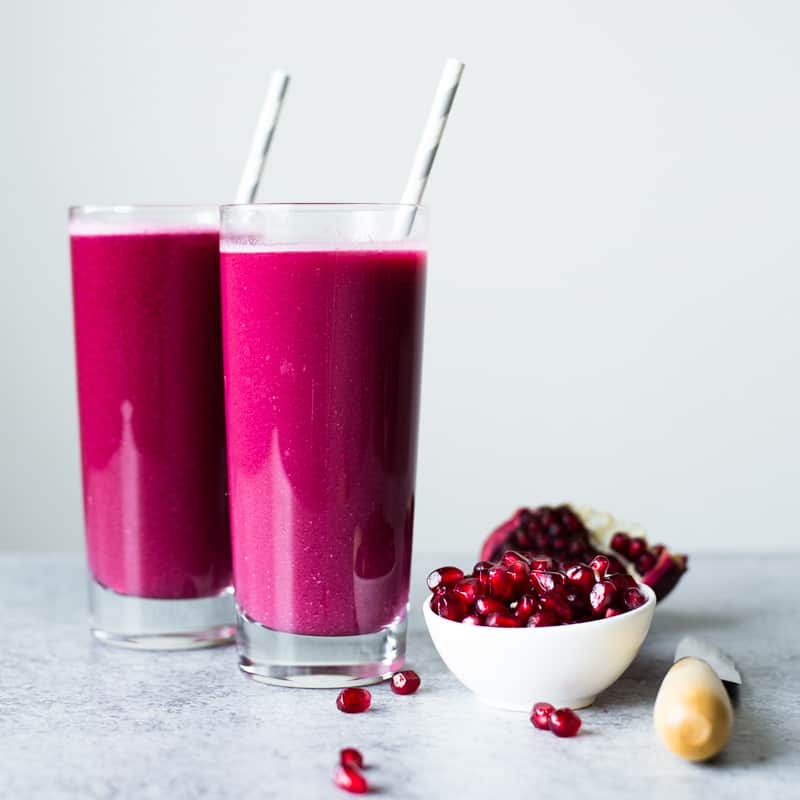If you’re like most people, you probably think of pomegranates as a delicious fruit that’s a great addition to your diet. But what you may not know is that pomegranates offer a wealth of health benefits as well. In this blog post, we’ll take a closer look at some of the top benefits of pomegranate and why you should consider adding this superfood to your diet.
What are pomegranates?
Pomegranates are a type of fruit that is native to Asia and the Middle East. The pomegranate tree is a small shrub that typically grows to about 10 feet tall. The fruit of the pomegranate is about the size of an apple and has a hard outer shell with a reddish-brown color. Inside the fruit, there are many small seeds that are surrounded by a red pulp, known as pomegranate arils. Pomegranates have been used medicinally for centuries. The first recorded use of pomegranate was in China over 4,000 years ago. In traditional Chinese medicine, pomegranates were used to treat stomachaches, diarrhea, and other digestive problems.
The nutritional benefits of eating pomegranates are vast. Pomegranates are a good source of fiber, vitamin C, and potassium. They also contain antioxidants, which can help protect your body against disease. In addition, pomegranates may help improve heart health and reduce the risk of cancer.
The benefits of pomegranate are due to its high content of polyphenols, including ellagitannins, anthocyanins, hydroxybenzoic acids, and ellagic acid. These compounds have been shown to have antioxidant, anti-inflammatory, and anti-cancer properties. In particular, ellagic acid has been shown to inhibit the growth of cancer cells.
9 health benefits of pomegranates
1. Packed with nutrients
Pomegranates are an excellent source of ascorbic acid (vitamin C) and have rich antioxidant content. Pomegranates also offer several other nutritional benefits, including vitamin E, potassium, and fiber.
Here’s the nutritional value for the arils in one average (282-gram) pomegranate fruit:
- Calories: 235
- Protein: 4.7 grams
- Fat: 3.2 grams
- Carbohydrates: 53 grams
- Sugar: 38.5 grams
- Fiber: 11.2 grams
2. Help keep inflammation at bay
One of the most promising areas of research is the potential of pomegranate extracts to reduce inflammation. Inflammation is a process that occurs when the body’s immune system responds to an irritant or injury. While some degree of inflammation is necessary for healing, chronic inflammation can lead to a variety of serious health problems. Pomegranate compounds have been shown to inhibit the activity of several key inflammatory enzymes, which may help to reduce the risk of these conditions.
This is believed to be due to the presence of flavonoids and anthocyanins, which are known to have anti-inflammatory properties. In addition, drinking pomegranate juice may also help to reduce oxidative stress, which is another major contributor to inflammation. (Both rheumatoid arthritis and chronic inflammation are characterized by high levels of oxidative stress.)
3. May improve heart health
Pomegranate juice have long been associated with heart health benefits. The antioxidants in pomegranates may help protect the artery walls from damage, which can reduce the risk of atherosclerosis. Another way that pomegranate improves heart health is by reducing systolic blood pressure. High systolic blood pressure is a major risk factor for cardiovascular diseases, such as heart attacks and strokes. Pomegranate has also been shown to help reduce blood pressure and cholesterol levels as well as improve cardiovascular health.
Pomegranate may also improve cardiovascular health by reducing oxidative stress and inflammation. These are both major risk factors for heart disease. In addition, pomegranate has been shown to improve blood flow to the heart and reduce the risk of atherosclerosis (hardening of the arteries) by increasing high-density lipoprotein (HDL). HDL is a type of cholesterol that helps to remove excess cholesterol from the arteries and protect against heart disease.
4. May lower cancer risk
Modern science has begun to validate many of the traditional uses for pomegranates, including their ability to lower cancer risk, specifically skin cancer & prostate cancer. Consuming pomegranates can protect the skin from damage caused by ultraviolet radiation by increasing the skin’s production of collagen, providing a protective barrier against UV rays. Additionally, pomegranates contain ellagitannins, which are antioxidants that can help to protect cells from damage caused by free radicals. Ellagitannins have also been shown to inhibit the tumor growth of prostate cancer cells.
5. May improve brain health
Pomegranate seed is a superfood that has many benefits for overall health, including brain health. Pomegranate is rich in antioxidants, which can help to protect the brain from damage caused by free radicals. Free radicals are destructive molecules that can damage cells and lead to inflammation. In addition, pomegranate has been shown to boost blood circulation and improve blood flow to the brain. This increased blood flow provides the brain with more oxygen and nutrients, which can help to improve cognitive function & memory retention. Pomegranate can help to protect against age-related mental decline like Alzheimer’s disease and dementia.
6. Promote digestive health
Consuming pomegranate juice has been shown to promote digestive health. One way it does this is by supporting healthy gut bacteria. The gut microbiome is made up of trillions of microbes that play a role in everything from nutrient absorption to immune function. Research has shown that pomegranate can help to increase the diversity of gut bacteria, which is beneficial for overall health. Additionally, pomegranate contains compounds that can help to reduce inflammation in the digestive tract. This is important because chronic inflammation is a major contributor to many gastrointestinal disorders.
Pomegranate juice has also been shown to inhibit the growth of Candida Albicans, a type of yeast that can cause problems when it overgrows. The pomegranate peel contains a compound known as punicalagin, which provides antifungal activity against Candida albicans (C. Albicans).
7. Support joint health & muscle recovery
Pomegranates have been shown to be effective in supporting joint health and muscle recovery. The fruit is rich in several antioxidants, including punicalagin and ellagic acid. These compounds help to reduce inflammation, which can lead to joint pain and stiffness. Additionally, pomegranates contain vitamins C and K, both of which are necessary for building and maintaining healthy bones. The fruit also contains high levels of polyphenols, which have been shown to promote muscle recovery after exercise. In one study, cyclists who consumed pomegranate juice before and after exercise had reduced levels of markers of muscle damage compared to those who did not consume the juice. In addition, pomegranate extract has been shown to reduce inflammation and speed up healing in animal models of tendon injury.
8. Boost immunity
Pomegranate arils have been celebrated for their healing properties for centuries. Modern science has now confirmed that these super fruits can indeed boost immunity. Pomegranate seeds are a good source of vitamins C and E, both of which are important for immune function. They also contain ellagitannins, a type of phytonutrient that has powerful antioxidant and anti-inflammatory effects. In one study, ellagitannin extracts from pomegranate fruit were found to have some antimicrobial properties by inhibiting the growth of several types of bacteria, including methicillin-resistant Staphylococcus aureus (MRSA). The ellagitannins in pomegranate juice were also shown to stimulate the production of macrophages, a type of white blood cell that plays a key role in the immune response.
9. Improve urinary health
Pomegranate juice has been shown to improve urinary health. The benefits are attributed to the high concentration of compounds called punicalagins, which are found in the fruit’s peel and juice. Punicalagins are converted into ellagic acid in the body, which has been shown to inhibit the growth of various types of cancer cells.
One study showed that drinking pomegranate juice may help improve symptoms associated with Benign Prostatic Hyperplasia (BPH), such as urinary frequency and urgency. Pomegranate juice was also found to improve erectile dysfunction (ED) in a separate study.
Best ways to consume pomegranate
One way is to take pomegranate extract in pill form. This concentrated form of pomegranate provides all the same benefits as consuming the whole fruit but is much more convenient. This is great for people who do not like the taste of pomegranates.
Another option is to drink fresh pomegranate juice. Pomegranate juice is available at most grocery stores, and can be enjoyed by itself or mixed with other juices.
Pomegranate seeds can also be eaten raw as a healthy snack. Just one pomegranate can contain up to 600 seeds, which are packed with antioxidants and other nutrients. To eat the seeds, simply cut open a pomegranate and scoop them out with a spoon.
If you are looking for a more creative way to consume them, try adding pomegranate extract to salads, smoothies, or yogurt. You can also use the seeds as a garnish on various dishes. Whichever method you choose, incorporating pomegranate into your diet is a delicious and easy way to improve your health!
Amount of calories in a pomegranate fruit
One average (282-gram) pomegranate fruit has about 234 calories. That is more than three times the amount of calories in an apple. Most of the calories in a pomegranate come from sugars. The sugar content in a pomegranate is about 38.6 grams. Fat and protein make up a small percentage of the calories in a pomegranate.
What is the best time to eat pomegranate?
There is no one answer to this question, as the best time to eat pomegranate will vary depending on your individual dietary needs and preferences. However, pomegranates are a great choice for a healthy snack, and they can be eaten at any time of the day.
How much pomegranate should I eat a day?
While the benefits of eating pomegranate are vast, it’s important to note that not everyone needs to eat the same amount. Pregnant women and people with health conditions should consult a doctor before adding pomegranate to their diet. For most people, however, eating one or two pomegranates per day is a safe and healthy way to enjoy the benefits of this superfood.
Are pomegranates suitable for diabetic patients?
Pomegranates contain a cocktail of antioxidants, including ellagitannins and anthocyanins, which have been shown to help lower blood sugar levels. Pomegranates contain a compound called punicalagin, which has been shown to help improve insulin sensitivity. As a result, pomegranates may help diabetics to better regulate their blood sugar levels.
Additionally, pomegranate seeds are a great source of the compound punicic acid, which has been shown to have a number of benefits for human health. Punicic acid is a type of Omega-5 fatty acid, which is a healthy type of fat that can help to reduce inflammation in the body. Punicic acid has been shown to reduce the risk of type 2 diabetes.
However, since most of the calories in a pomegranate still come from sugars, diabetic patients should consume the fruit in moderation.
It is also important to note that the benefits of pomegranate for diabetics have not been conclusive, so more research in human trials is needed to confirm these benefits in humans.
Can pomegranates help with weight loss?
Pomegranates may help with weight loss in several ways. First, the ellagitannins in pomegranates have been shown to help reduce the number of fat cells in the body. Additionally, pomegranates are a good source of fiber, which can help you to feel fuller for longer and prevent overeating. Finally, the punicalagins in pomegranates may help improve insulin sensitivity, which may help to regulate blood sugar levels and prevent cravings.
While pomegranates offer a number of benefits for weight loss, it is important to remember that they are still high in calories. As such, pomegranates should be eaten in moderation as part of a healthy diet and exercise plan.
Pomegranates are a healthy fruit that offer a number of benefits, but they can also cause allergic reactions in some people.
What are the disadvantages of pomegranates?
Though pomegranates offer a number of benefits, there are also several disadvantages associated with this fruit. One of the primary disadvantages of pomegranates is their cost. This fruit is typically more expensive than other common fruits, such as apples or bananas. In addition, pomegranates can be difficult to eat and can stain clothing. The thick skin of a pomegranate must be carefully removed, and the seeds inside can be messy to eat. Finally, some people find the taste of pomegranates to be sour and unappealing. While this fruit does offer many health benefits, it may not be worth the effort for those who do not enjoy its taste or texture.
What are the symptoms of an allergic reaction to pomegranate?
The symptoms of an allergic reaction to pomegranate can vary depending on the person. However, common symptoms include itching, hives, and swelling. If you experience any of these symptoms, it is important to seek medical help immediately.
Pomegranates are a healthy fruit that offer a number of benefits, but they can also cause allergic reactions in some people.
In Summary
So far, the research on pomegranates looks very promising and even though more human trials are needed to confirm the benefits, the antioxidant levels and anti-inflammatory effects are impressive, and there is potential for benefits related to heart health, cancer prevention, and more. Pomegranates are a great addition to your diet–they’re delicious and nutritious! Add them in wherever you can–in smoothies, sprinkled on yogurt or oatmeal, as part of a salad or main dish. And if you want to be sure you’re getting all the goodness pomegranates have to offer, look for juice or supplements that contain pure pomegranate juice. Enjoy adding this superfood to your healthy lifestyle!









